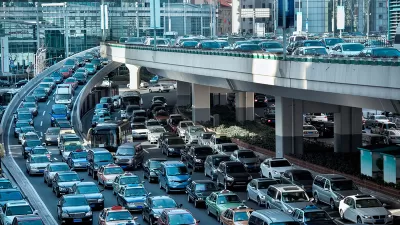Fewer workers in downtown Seattle are taking public transit to work thanks in large part to an ongoing move to remote work.

Following a massive shift to remote work during the COVID-19 pandemic, downtown Seattle's transit ridership has plunged. According to an article by David Kroman, whereas more than half of downtown workers used transit in 2019, that number dropped to 18 percent at the end of 2021. "Meanwhile, the share of workers driving alone to work remained roughly the same, at a quarter of all employees."
Kroman writes that "The Downtown Seattle Association estimates there were 321,000 jobs downtown in 2021. Once upon a time, just 6% of all employees from downtown businesses worked remotely. That number jumped to 46% over the course of the pandemic, according to the survey of 4,371 employees."
"Among those still commuting into work, which mode they choose is driven by convenience. Thirty-eight percent of drivers said they did so because it was the most flexible, while another 19% said it was the fastest way into work. Asked what would increase transit ridership, 31% said more routes and 12% said faster service." Madeline Feig, spokesperson for Commute Seattle, says "the dip in transit use is hopefully a temporary one that will reverse as people realize service is close to normal."
FULL STORY: New data shows remote work surges, transit use collapses among workers in downtown Seattle

Maui's Vacation Rental Debate Turns Ugly
Verbal attacks, misinformation campaigns and fistfights plague a high-stakes debate to convert thousands of vacation rentals into long-term housing.

Planetizen Federal Action Tracker
A weekly monitor of how Trump’s orders and actions are impacting planners and planning in America.

In Urban Planning, AI Prompting Could be the New Design Thinking
Creativity has long been key to great urban design. What if we see AI as our new creative partner?

King County Supportive Housing Program Offers Hope for Unhoused Residents
The county is taking a ‘Housing First’ approach that prioritizes getting people into housing, then offering wraparound supportive services.

Researchers Use AI to Get Clearer Picture of US Housing
Analysts are using artificial intelligence to supercharge their research by allowing them to comb through data faster. Though these AI tools can be error prone, they save time and housing researchers are optimistic about the future.

Making Shared Micromobility More Inclusive
Cities and shared mobility system operators can do more to include people with disabilities in planning and operations, per a new report.
Urban Design for Planners 1: Software Tools
This six-course series explores essential urban design concepts using open source software and equips planners with the tools they need to participate fully in the urban design process.
Planning for Universal Design
Learn the tools for implementing Universal Design in planning regulations.
planning NEXT
Appalachian Highlands Housing Partners
Mpact (founded as Rail~Volution)
City of Camden Redevelopment Agency
City of Astoria
City of Portland
City of Laramie





























